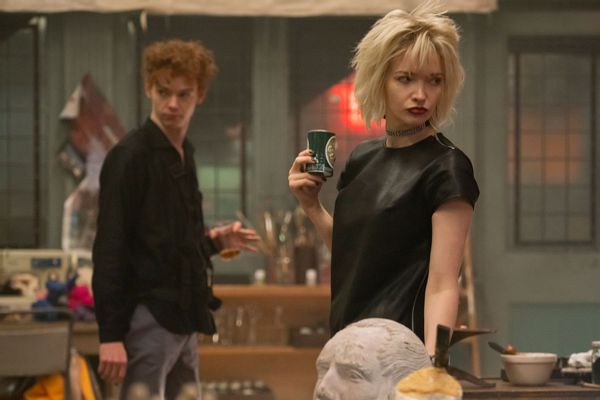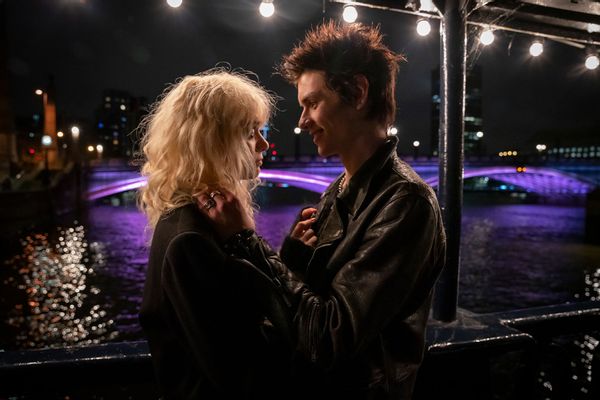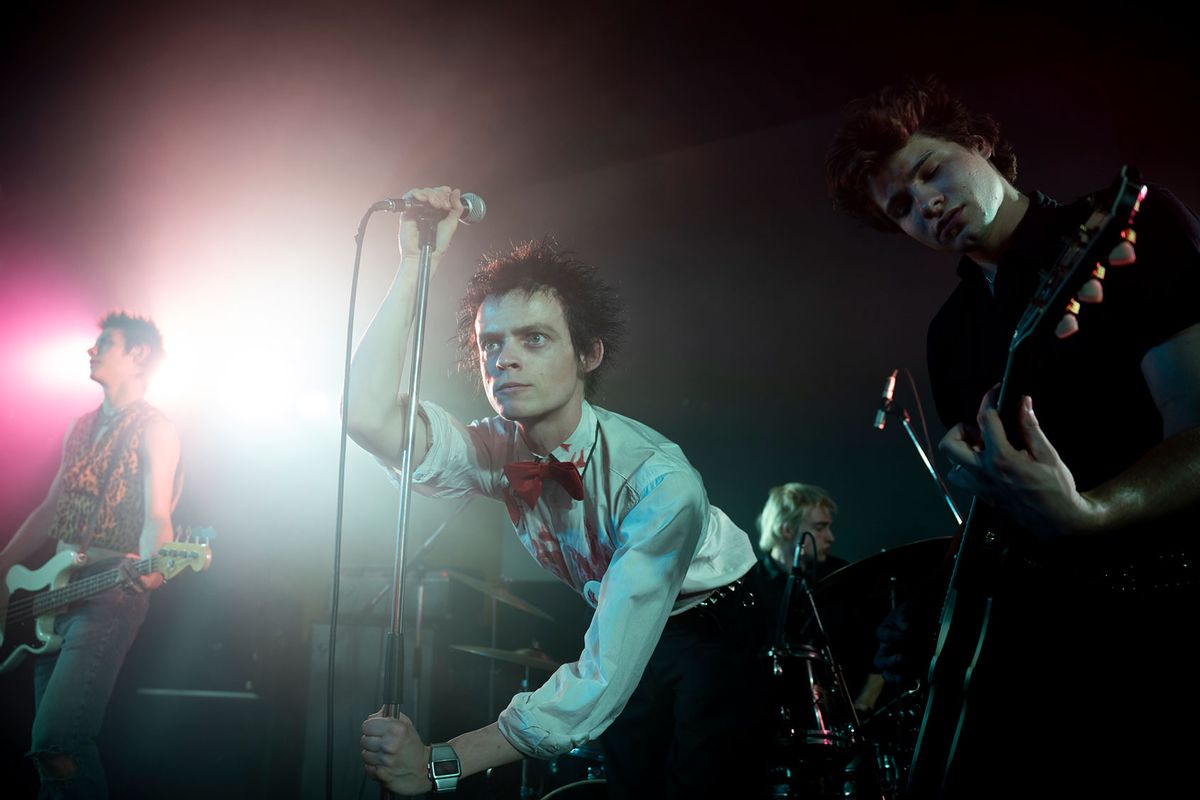Projects like "Pistol" exist within the tension of what the audience is expecting and what never realized it needed to know about its subject – in this case, The Sex Pistols. Space like that should have given series creator and writer Craig Pearce and director Danny Boyle ample room to take a famous rock n' roll story and create something unexpected and illuminating.
To some degree, the FX on Hulu series achieves this, only by way of its performances as opposed to the band's history. There's an appropriateness in that, given that the band's legend is more tied to what it represented than its musicianship. However, its symbolism was powerful enough to define a genre of music that was already alive and pulsing before the Sex Pistols existed and persists 45 years after its biggest hit, "God Save the Queen," mocked Queen Elizabeth II's Silver Jubilee celebration.
The Queen's popularity remains high even now, as does Jamie Reid's iconic cover for the Sex Pistols' single. Generations later that image emblemizes rebellion and anarchy and has adorned millions of T-shirts and bedroom wall posters, even those of kids who may have never have heard the band's only album.
Telling Steve Jones' take on the history ... enables Danny Boyle to dance between personal nostalgia and commonly shared memory.
But "Pistol" doesn't seem to have been designed for the generations born too late to have experienced the 1970s punk rock scene first or even second-hand, as was the case for most of Generation X. Mainly it feels like an exercise in performance or a ritual to instill one of rock's most famous and shortest-lived chaos storms with a forlorn, friable spirit.
The way that Boyle and Pearce realize "Pistol" ensures this idea isn't at odds with the explosion of clanging guitars, screaming, and expectoration that defines the Sex Pistols, pre-cultural hijacking and repackaging for Hot Topic shoppers.
RELATED: "Pam & Tommy" is the greatest, hugest love story ever told about an unauthorized celebrity sex tape
On the contrary, the limited series humanizes the legend by presenting the band's story from the point of view of guitarist Steve Jones, whose memoir "Lonely Boy: Tales from a Sex Pistol" inspires Pearce's scripts.
Telling Jones' take on the history, embodied in Toby Wallace's introspective performance, enables Boyle to dance between personal nostalgia and commonly shared memory. And this also allows Pearce to explore the contradictory beginnings of the confrontational force that the band eventually became, with Jones finding music and performance as a means of disappearing from a life he detested.
We meet him in the throes of Bowie worship and stumble along with him as he crashes into the lives of Vivienne Westwood (Talulah Riley) and Malcolm McLaren (an energizing, knavish Thomas Brodie-Sangster). The former wants to revolutionize Britain's stagnant art scene through confrontational fashion; McLaren is a brand-cognizant huckster constantly on the lookout for a way or a person to make his profile bigger.
 Pistol (Miya Mizuno/FX)
Pistol (Miya Mizuno/FX)
Jones has a band but hasn't mastered stage presence, which suits McLaren's purposes magnificently. The eventual manager views Jones and his bandmates Paul Cook (Jacob Slater ) and Glen Matlock (Christian Lees) as clay that can be molded into a saleable product. He's right, and this also comes at a cost.
As the book's title suggests, Wallace gives Jones a soulfulness and sensitivity obscured by his bravado once he learns to properly pound the hell out of his guitar and embraces the diseased alley cat energy eventually brought to the band by Johnny Rotten, rendered with scary precision by Anson Boon. Boon is an abrasive whirl from the moment he comes onto the screen, all derision and sneering, but even at the frontman's most unrefined, he reveals an intellectual acuity in his personality.
John Lydon, the man behind the Rotten stage moniker, reportedly was unhappy with the way he was portrayed in Jones' memoir. He sued Jones and Cook to prevent the band's music from being used in the series and lost. This is worth bringing up if only to wonder whether Lydon could ever appreciate the way Boon's work ignites the story.
The best sequences are replays of familiar history. The content we know less about ... lacks focus and energy.
In some schools of thought, all "Pistol" really must do is get Lydon's character right along with his one-time manager and all-time nemesis McLaren. Previous stories position both men prominently, which is understandable considering their central importance to the Sex Pistols, the lasting fame each forged for themselves in the band's afterlife, and their everlasting enmity.
You'll notice that Sid Vicious isn't mentioned despite being the poster model for punk rock and rebellion. He enters late in the series by way of Louis Partridge, who makes him as boyish, haunted, and violent as Emma Appleton's Nancy Spungen is slovenly and manipulative, the black hole of need to his aimless asteroid.
 Pistol (Miya Mizuno/FX)
Pistol (Miya Mizuno/FX)
But those two actors were always going to be battling the iconography of rock n' roll's most doomed and twisted romantics, along with their screen personas established by Chloe Webb and Gary Oldman in Alex Cox's 1986 cult classic "Sid and Nancy."
Mentioning their names returns us to that notion of what we expect from "Pistol" versus what the show gives us, which entails a lot of stagnancy and exasperation. The best sequences are replays of familiar history. The content we know less about, i.e. the preamble to Lydon joining the band, lacks focus and energy.
Even when the narrative tightens its focus, key characters – mainly the women in the cast – are swept away by the tide. Frustratingly this includes a sub-(sub)-plot featuring Sydney Chandler's Chrissie Hynde, one of Westwood's employees at her boutique SEX who has real talent and aspires to be in a band too, but who McLaren willfully ignores to ensure his rock show-ponies take the media lead in punk rock's rise.
Riley's Westwood also is presented as a McLaren satellite, but at least she and Chandler are afforded more character development to work with that Maisie Williams' punk model icon Jordan, a widely recognizable enigma about whom little is commonly known. This series keeps it that way, which is a choice . . . as is hiring a famously gifted actor to play her and not giving her much to evoke.
Want a daily wrap-up of all the news and commentary Salon has to offer? Subscribe to our morning newsletter, Crash Course.
(At least she's given stunning costumes to work with; Bianca Stephens, an incredible British actress, is afforded even less dignity as a mentally ill woman whose main purpose is to sustain horrific abuse and derision to eventually inspire the Pistols' single "Pauline." She's also the only performer of color with any lines or depth, and she's around for a single episode.)
Indeed, if not for Jones' autobiography providing the foundation for "Pistol," one wonders if Boyle and Pearce may have been better served by focusing on McLaren instead of relegating him to secondary status. He's no hero – that makes Brodie-Sangster so watchable – but he is a Machiavellian force who ends up midwifing several rock luminaries to stardom whether directly or, in Hynde's case, as an oppositional springboard.
Wishing for what could have been is always simpler than embracing what is. Plus, Jones, Cook, and Lydon – and Westwood, for that matter – will have the main say in whatever versions of the Sex Pistols story end up being told from here on out because McLaren is dead.
Nevertheless, 20 years ago he understood precisely what holds back stories like this. It's the same problem counterculture has always faced once it's gone mainstream, summed up in two words, as he opined in a 2002 column for The Guardian.
"One is 'authenticity' and the other is 'karaoke,'" McLaren wrote. "Karaoke is miming the words of others. It is a life by proxy, liberated by hindsight, unencumbered by the messy process of creativity."
That's "Pistol" in a nutshell. What some of us want is a different peek into a revolution, a taste of something real behind all the photos. What we get is another common souvenir, courtesy of a decently wailed version of a ditty we've heard before.
FX's "Pistol" premieres May 31 on Hulu. Watch a trailer for it below, via YouTube.
More stories like this:



Shares